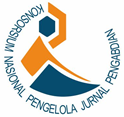Upaya Peningkatan Imunitas Tubuh Untuk Mengoptimalkan Kinerja Karyawan Selama Pandemi COVID-19
Abstract
Salah satu upaya yang dilakukan pemerintah untuk menekan penyebaran virus COVID-19 di Indonesia adalah kebijakan bekerja dari rumah (WFH). Penerapan kebijakan ini disesuaikan dengan kebutuhan masing-masing instansi sehingga masih terdapat karyawan yang tetap harus bekerja dari kantor (WFO). Kebijakan Universitas Negeri Surabaya terkait aturan tersebut berupa penjadwalan masuk kerja karyawan agar kegiatan pelayanan kampus tetap dapat berjalan dengan optimal. Hal ini menyebabkan karyawan Universitas Negeri Surabaya memiliki peluang yang lebih besar untuk terjangkit virus COVID-19 sehingga diperlukan upaya peningkatan imunitas tubuh agar dapat mengoptimalkan kinerja karyawan selama pandemi COVID-19. Kegiatan pengabdian ini dilakukan melalui tahap persiapan, tahap indentifikasi masalah, tahap pengadaan dan penyaluran, serta tahap monitoring dan evaluasi. Hasil kegiatan ini menunjukkan bahwa kegiatan pembagian bantuan sembako dapat digunakan sebagai salah satu alternatif dalam upaya peningkatan imunitas tubuh untuk mengoptimalkan kinerja karyawan selama pandemi COVID-19. Hal ini ditunjukkan dari rata-rata hasil respon penerima sembako sebanyak 78,22% merasa sangat puas dengan pemberian sembako sehingga kegiatan ini sesuai dengan kebutuhan dalam meningkatkan kinerja karyawan.
Kata Kunci: Kinerja karyawan, kebijakan bekerja dari rumah, imunitas tubuh, pandemi Covid-19,
Abstract
The government has implemented the work from home (WFH) to reduce the spread out of the COVID-19 in Indonesia. This policy is tailored to the needs of each agency so that there are still employees who still have to work from office (WFO). The Surabaya State University policy regarding these rules is in the form of scheduling employee work attendance so that campus service activities can continue to run optimally. This causes Surabaya State University employees to have a greater chance of contracting the COVID-19 virus so that efforts to increase body immunity are needed in order to optimize employee performance during the COVID-19 pandemic. This service activity is carried out through the preparation stage, the problem identification stage, the procurement and distribution stage, and the monitoring and evaluation stage. The results of this activity indicate that the distribution of basic food assistance can be used as an alternative in efforts to increase body immunity to optimize employee performance during the COVID-19 pandemic. This is indicated by the average response results of foodstuff recipients as much as 78.22% who feel very satisfied with the provision of basic foodstuffs so that this activity is in accordance with the needs in improving employee performance.
Keywords: Covid-19 pandemic, employee performance, body immunity, work from home
Full Text:
PDFReferences
Aguinis, H., Villamor, I., & Gabriel, K. P. (2020). Understanding employee responses to COVID-19: a behavioral corporate social responsibility perspective. Management Research, 18(4), 421–438. https://doi.org/10.1108/MRJIAM-06-2020-1053
Agustina, Y., Septiany, P. R., Arlinda, A., & Safitri, K. (2020). Pembuatan keripik kelapa sebagai upaya pemulihan ekonomi pasca bencana di Kabupaten Lombok Utara. Jurnal Karinov, 3(2), 79-83.
Alvianis, P., & Purnomo, Y. S. (2020). Tinjauan hukum terhadap virus korona, pemecatan pegawai dan korupsi. 2(2), 2003–2004. https://doi.org/10.31228/osf.io/wcx6q
Baker, M. G. (2013). Who cannot work from home? Characterizing occupations facing increased risk during the COVID-19 pandemic using 2018 BLS data. Journal of Chemical Information and Modeling, 53(9), 1689–1699.
Crosbie, T., & Moore, J. (2004). Work–life Balance and Working from Home. Social Policy and Society, 3(3), 223–233. https://doi.org/10.1017/s1474746404001733
Herlina, N. (2020). Manajemen pembelajaran daring di perguruan tinggi pada masa pandemi COVID-19. Journal Civics & Social Studies, 4(2), 102–108. https://doi.org/10.31980/civicos.v4i2.925
Kustiandi, J., Ilmi, A. M., Ariansyah, A. G., Farhan, A. R., & ... (2020). SI-TACO: Media promotif dan preventif COVID-19 pada masyarakat Desa Ngembal Kabupaten Malang. Jurnal Karinov, 3(3), 147–152.
Madero Gómez, S., Ortiz Mendoza, O. E., Ramírez, J., & Olivas-Luján, M. R. (2020). Stress and myths related to the COVID-19 pandemic’s effects on remote work. Management Research, 18(4), 401–420. https://doi.org/10.1108/MRJIAM-06-2020-1065
Pahlevi, T., Sudarwanto, T., & Kurniawan, R. Y. (2020). Edukasi Pencegahan Penyebaran Covid 19 Melalui Peningkatan Gizi untuk Menjaga Imunitas Masyarakat Terdampak. Abimanyu: Journal of Community Engagement, 1(3), 18-25.
Pramanik, N. D. (2020). Dampak bantuan paket sembako dan bantuan langsung tunai terhadap kelangsungan hidup masyarakat padalarang pada masa pandemi COVID-19. Jurnal Ekonomi, Sosial dan Humaniora, 1(12), 113–120.
Putri, S. F., Putri, D., & Santi, I. N. (2020). Vidio animasi prilaku hidup bersih sehat sebagai media pendidikan masyarakat di masa new normal. Jurnal Karinov, 3(3), 201–207.
Roziqin, A., Mas’udi, S. Y. F., & Sihidi, I. T. (2021). An analysis of Indonesian government policies against COVID-19. Public Administration and Policy, ahead-of-p(ahead-of-print), 92–107. https://doi.org/10.1108/pap-08-2020-0039
Susanti, S., Kistyanto, A., Anwar, M. K., Handayani, S., Bahtiar, M. D., & Andriansyah, E. H. (2020). Pencegahan Penyebaran Covid-19 Melalui Peningkatan Ketahanan Pangan Bagi Warga Terdampak di Surabaya. Abimanyu: Journal of Community Engagement, 1(3), 1-7.
Xiao, Y., Becerik-Gerber, B., Lucas, G., & Roll, S. C. (2021). Impacts of working from home during COVID-19 pandemic on physical and mental well-being of office workstation users. Journal of Occupational and Environmental Medicine, 63(3), 181–190. https://doi.org/10.1097/JOM.0000000000002097
Zaharah, K. G. I., & Windarti, A. (2020). Dampak wabah virus corona terhadap kegiatan belajar mengajar di Indonesia. Salam: Jurnal Sosial Dan Budaya Syar’i, 7(3), 269–282.
DOI: http://dx.doi.org/10.17977/um045v4i2p%25p
Refbacks
- There are currently no refbacks.
Email: karinov@um.ac.id

This work is licensed under a Creative Commons Attribution-ShareAlike 4.0 International License.






